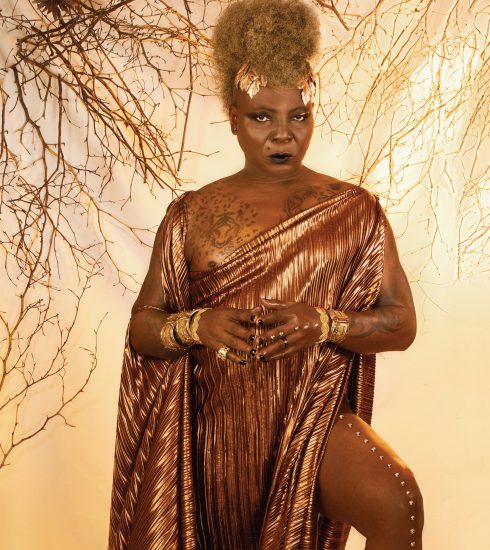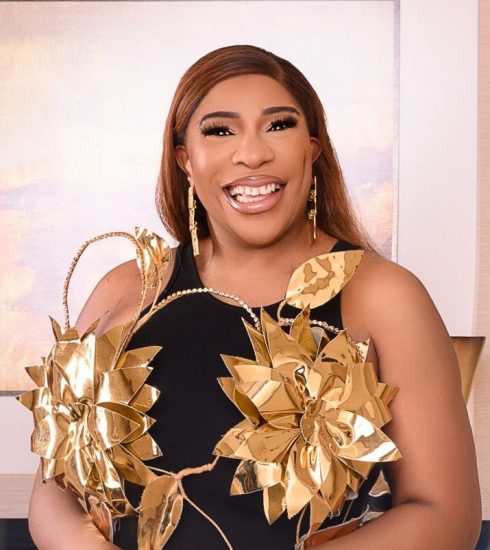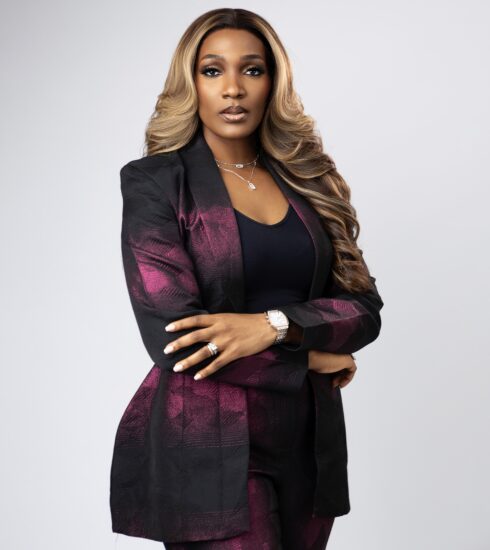Titi Kuti From Behind The Scenes To Being In Front Of The Camera
The inner workings of any media production involves way more people than just the actors. There are location managers, hair and makeup specialists, wardrobe managers, and of course, the crew. Tying all of these together is not an easy task, and for most producers, this is a thankless job. With more than 10 years in the business, Titi Kuti knows this more than most. His experiences with big live shows such as Nigeria’s Got Talent, Nigerian Idol, and more, alongside more mainstream film and television productions have made him a showbusiness veteran. His most recent forays, however, have moved him from behind the camera into more acting roles, such as 2018’s King of Boys (KOB) and this year’s sequel, King of Boys: Return of the King. In this sitdown with DOWNTOWN’s Boluwatife Adesina, he takes us through this unique career path, his interests, and the Nigerian film industry as a whole.
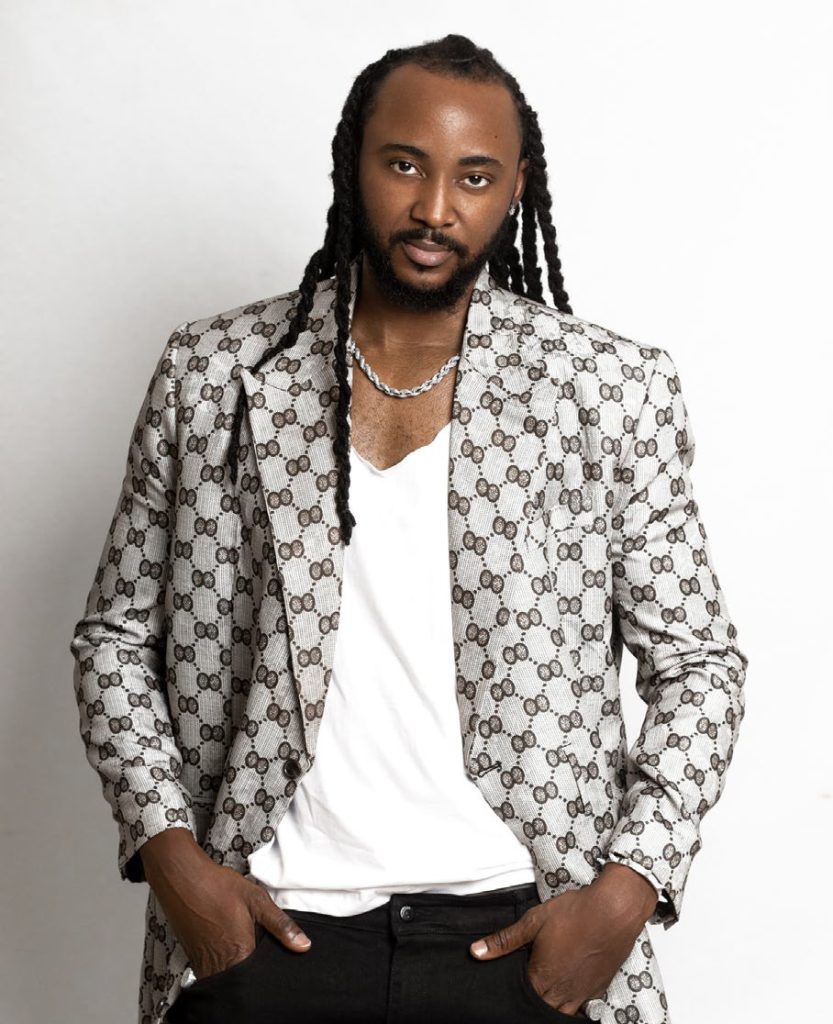
Titi Kuti
Firstly I want to congratulate you on a great performance in King of Boys II. What was your favorite part of the role?
So many favourite parts. The reason for this is because there are some scenes that I feel attached to because I know what it took to bring them to life. I would say that my top three favourite scenes were: The scene where I was with Sola Sobowale and my character was getting angry that she was focusing on the election instead of everything else going on. The welcome scene where Mrs. Salami was thanking Ade Tiger for standing by her. That may seem like a smaller scene but for me, that was one of the few scenes where Ade Tiger showed emotion in the entire series.
The third scene was the end scene, where everyone thought I would betray Oba but I stood my ground.
Ade Tiger’s fierce loyalty to Alhaja Salami is maybe the defining characteristic of his career. Just how important is loyalty to you in your everyday life?
It is very important to me. There are three principles I try to guide myself by in everything that I do: Do right by God and do right by principle; that is, is it the right thing to do? Thirdly, I try to do right by my conscience. If I have those three, I’m good.
As regards me being a loyal person, you’d have to ask those I have encountered in the journey. They can give a proper assessment of me, but personally, once I have those aforementioned three principles, I’m fine.
In that same vein, there has to be some limit to Ade Tiger’s loyalty. What would you say is the one thing he wouldn’t do for his boss?
[Laughs] That’s a tricky question. I would say that according to the script at least, there’s almost nothing he wouldn’t do for his boss. If she asked him to betray her I don’t think he would do it. Boxer’s ‘betrayal’ was left slightly ambiguous.
Can you explain more clearly the circumstances around that?
One thing I can say about KOB is that it’s a show that has to be seen at least 3 times. The first watch-through you probably will be carried away by the action, and with subsequent watches comes clarity. So I’m going to leave part of that question up to curiosity, for those who have only watched it once to go rewatch it. I’ll say this though: Boxer signed up to join us, possibly knowing that he was expendable, a sacrificial lamb for the greater good. It’s not every story beat that is passed across via dialogue. I’d suggest a rewatch of KOB2 to fully grasp the plot. I’ll even throw out a question to the readers: at what point did Ade Tiger tell Eniola Salami everything that had transpired? It wasn’t shown on screen, but keen eyes will know the moment it happened.
Have you ever been in a situation where your loyalty to someone was repaid with bad? How did you handle that?
So many times actually. One thing I’ve learned is people will be who they are. Don’t expect to get back exactly what you give to people. People will be who they are. Some will give more, some will give less. Irrespective of that, it has never discouraged me from trusting people. What I do is trust with my head and my eyes, not trusting blindly. I believe there is still good in humanity and won’t distrust another person because of what someone else did to me.
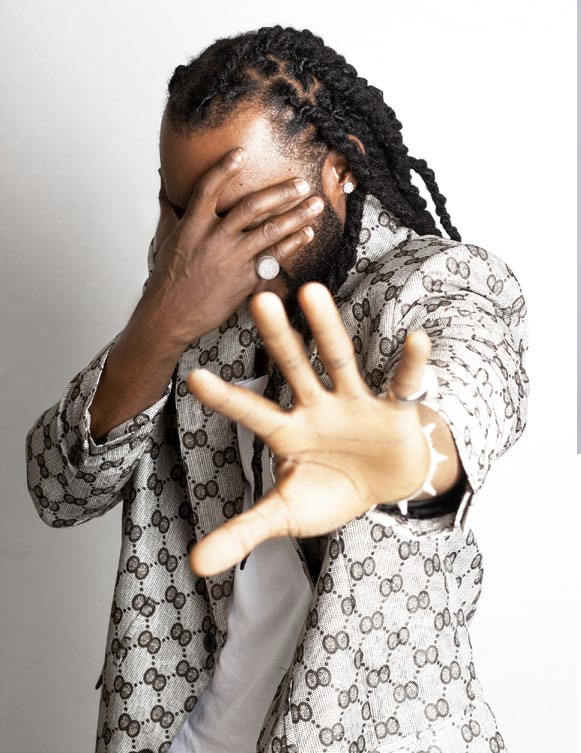
Titi Kuti
Your character’s on-screen relationship with Alhaja Salami’s character is one of the strongest on the show. Did you get to know Mrs. Sobowale any better as a result?
One thing not many people know is that I’d met Sola Sobowale before even KOB 1. I’ve been a producer for a really long time and I met Mrs. Sobowale during her time on a show I produced for Africa Magic way back when called Hustle. I produced three seasons of that show and that is when we had our first encounter. During that time I was acting on the side and it was even on Hustle that I first appeared in front of the camera. So Sola Sobowale once pointed out to me that most actors, after long careers, go and learn production. She said that since my production skills are already there, why don’t I push this acting thing. She really spoke to something that was already on my mind and that’s how my acting career started. The first time that she and I were going to work on screen was a remake of a 90s blockbuster called Palace. The producers had been speaking to her about finding someone to play her son. When she saw that I had auditioned for the role, she just jumped on it right away. So that was the first time that she and I worked together in an acting capacity. When KOB 1 came around, having worked with her previously, I understood her pace and working style. You can’t work with her and not give your best. What she brings to the table will push you up. So it’s not a relationship that started recently. We’re bosom friends.
How did you get in the right frame of mind to play the character? How did you approach that?
For Ade Tiger, in KOB 1 I fell in love with what Kemi Adetiba was going for with the character. In this part of the world, the stereotypical physique and mannerism of an enforcer are that of a bouncer with a deep voice. She went a different way. The most powerful gangsters are not usually built like brick houses. So when Kemi Adetiba came up with this character I was intrigued. To get into the right frame of mind, I disengaged for a month. I saw the magnitude of both the story’s potential impact and my character’s place in that story. For the first 10 days, while disengaging, I read the script. For all the viewers of the show who noted all the twists and turns present in the plot, all the actors were stunned by the unpredictability of the script as well! The next two weeks were spent becoming Ade Tiger. I was memorising lines, watching shows and films that had similar characters. I spent some time discussing the character’s wardrobe with the costume designer as well. We broke down every scene and the look for every scene that Ade Tiger appeared in. Even after all the preparation, Kemi Adetiba wanted more. During the filing period, I was Ade Tiger. I couldn’t switch out at any point in time. I would be hanging out with castmates but deep down, Ade Tiger was looking to run the next line.
Who have been some of the biggest influences on your acting career?
I have a lot of people that I watched for a long time coming up, but the person I would say that has affected my career most directly is Sola Sobowale, definitely. RMD (Richard Mofe-Damijo) was another actor I looked up to for the longest time. I finally got to meet him and speak to him on the set of King of Boys and he was surprised to hear how often I watched him and even practiced his monologues. There are so many other actors that I haven’t had the opportunity to meet, but if I do I’ll definitely mention to them the influence they had on my craft.
How do you feel when you make your fans become engrossed in the lives of your character? Does it ever spill into your real life?
Firstly, I want to say that I have as much love for the fans as they have for me. It’s every actor’s joy to have created an experience for the viewers with their performance. It’s a rare privilege. People do walk up to me and try to get conversations going and I welcome all of them. My DMs are flooded and even though I can’t possibly answer them all, I try as much as possible to take time to respond to as many as I can. I haven’t gotten too much criticism, however, which is what I actually look out for. I didn’t watch the film for the first two weeks. I was looking to hear feedback and criticism before watching because if you watch before hearing the reviews, you may not see what the people who gave feedback were talking about. Once I’m back in Nigeria, one of the first things I want to do is a meet and greet so that anyone interested can come and say hello. There’s no need to be proud. I’ve seen how easily some people can get so entitled. I always try to keep things in perspective.
The entertainment industry is said to be full of stress and pressure; what do you do to tackle said pressure?
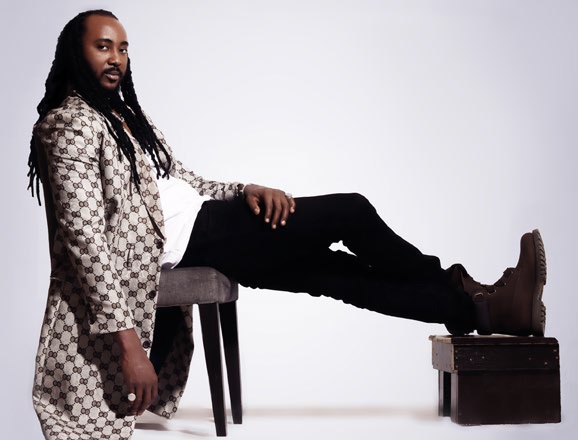
Titi Kuti
One thing I like to do is live life to the fullest. Everyone has one life to live and if you miss out on actually living it, it’s difficult to get that back. So for me, I have several ways in which I deal with pressure. Sometimes I disappear, sometimes I socialise, it varies. I’m an adventurous person, I like to try new stuff and go new places. It’s not that I have a place of zen or anything like that. Today you can find me skydiving, tomorrow you may find me scuba diving.
Obviously, we have to ask the question about your family ties as not a lot has been said about it. Are you related to the Kutis?
There’s actually an article online from the Tribune newspaper that answers this question. I’ve seen a lot of other articles that insinuate that I am Fela’s hidden son and other unsavory things. I‘ll clear the air. It’s the same family, we’re related but I’m not his son. My father is still very much alive. Fela was someone I greatly admired from childhood as someone who spoke truth to power through his music and refused to be silenced. For what it’s worth, I’m proud to be associated by blood with his family, but I’m not his son. He has biological children and things like what those unsavory articles publish affect them as well.
Tell us about your transition from behind the cameras to in front of it.
I started my career as a presenter on Nigezie TV, a lifestyle and entertainment channel in the late 2000s. My boss then would always tell me about how I was underutilising my capacity and he made me a producer of the show I was presenting on. A few months down the line, four more shows were given to me to produce, and eventually, I became the head of production on the channel. Shortly after, I began producing all the big format shows like Nigeria’s Got Talent, Nigerian Idol. I did that for five years. It was until 2016 when Hustle on Africa Magic got started that I got back into mainstream television production.
From there I got into acting when I had to step into a role due to conflicts with one of our day players. It was meant to be a one-off but the character kept getting written into the show. The next time I was on screen was in a film called Palace, a remake of a 90s blockbuster. After Palace was King of Boys.
What was it like being on the King of Boys set working with the biggest names in Nollywood?
I had already worked with many of the actors on the show in a producer’s capacity. It even became a joke they would crack, feigning surprise that I had stepped in front of the camera. All of the cast were very mature during the filming process. In KOB 2 especially, every actor was like a blockchain. The weakest link failing would’ve made the film less impactful than it should’ve been so everyone was carried along. The togetherness was so strong that everyone was fine with coming back to reshoot a scene because of one person. We had an actors’ WhatsApp group and everyone had the same level of professionalism. Both the cast and crew were in harmony with the director’s vision. No one grumbled about reshoots. Everyone was there for excellence. It was a very challenging shoot, but every step of it was worth it all the way. KOB’s filming was a film on its own.
Nollywood is the second largest movie industry in the world only after Hollywood. Where do you see our production level now in comparison to the world’s greatest productions?
What I would say about Nollywood is that the last 20 years have been a tremendous leap. The progression has been geometric. The narratives are better, the film quality is better. I’m glad that projects like KOB have redefined the perception of narratives concerning the inclusion of indigenous languages. You can’t sell the narrative without the language. It’s so important. If you look at films like The Wedding Party, that’s why those films are that successful. The narratives are indigenous enough that the average Nigerian would watch that film and note that that is how a proper Iya Basira would behave. KOB 2 did this as well. The gangsterism portrayed in that film is real ground-level stuff. Makanaki spoke Yoruba, Odogwu Malay spoke Igbo, that is what made the film so rich. There are a couple of films on Netflix that are doing great things for Nigeria like Smart Money Women. We aren’t at the finish line yet, but we’ve come a long way from where we started. The eyes of the world are turning to us. Someone sent me a video of a session in the UK parliament where the chairman was talking about KOB. These people don’t speak Yoruba or Igbo but they still appreciated a good film.
If you make a Sango film today that is faithful to the character, do you think it won’t give Thor a run for his money?
Imagine having a $1 Million budget to shoot Sango and you give it to Kemi Adetiba to direct. All those stories in the western world, we have their equivalents or even superiors here. Were you comfortable with the more serialized format of KOB 2 or do you prefer the more familiar environment of a movie set? I would say that in Nigeria, the pressure is the same. I know there are financial and time constraints, but I want to implore more producers to have more of an emphasis on actors absorbing characters than they currently do. The reason why you see the same faces in a lot of films these days is that, to a large extent, those guys are trusted by the producers. Most producers believe they don’t have time to discover new talents. The only way you can discover new talents is to give them a chance. Even these experienced actors, no matter how good they are, would do even better if they were given time. Hopefully, we get more money pumped into our industry so there can be a budget to accommodate these things.
How much do you think streaming platforms like Netflix have changed Nollywood?
I think it’s a very welcome development. Netflix has become a platform with a global audience. For you to become an international act, you need various platforms that provide different alternatives. The fact that Netflix is here does not stop cinemas from making their money. Platforms like Netflix have quickly identified the traction they have gained in Nigeria and are seeking to leverage on that. Nigerian actors are now getting put front and center. I saw Sola Sobowale in the same graphic as Idris Elba. That is how you globalise the industry, with alternative platforms. You’re a model, presenter, producer, director, actor. Do you have any hidden talents we don’t know about? [Laughs] I’m still discovering myself daily. If I find something I have an anointing for, I’ll definitely try it. It’s one life I’ve got.
Are you going to act more or you’re going to balance your time with production?
Definitely, I’ll act more. Production is already in my DNA. There are projects that will come up that I will be involved in as a producer, but I definitely will act more. I believe I have a mark to make so I definitely will act more. That doesn’t mean you’ll see me in 10 films in one year though. I don’t think I’m that person. I will definitely push the acting more.
Do you have any projects we should be looking forward to?
Yes, I do, I have a project I’m working on. I’m not going to let the cat out of the bag just yet, but the project is filming.
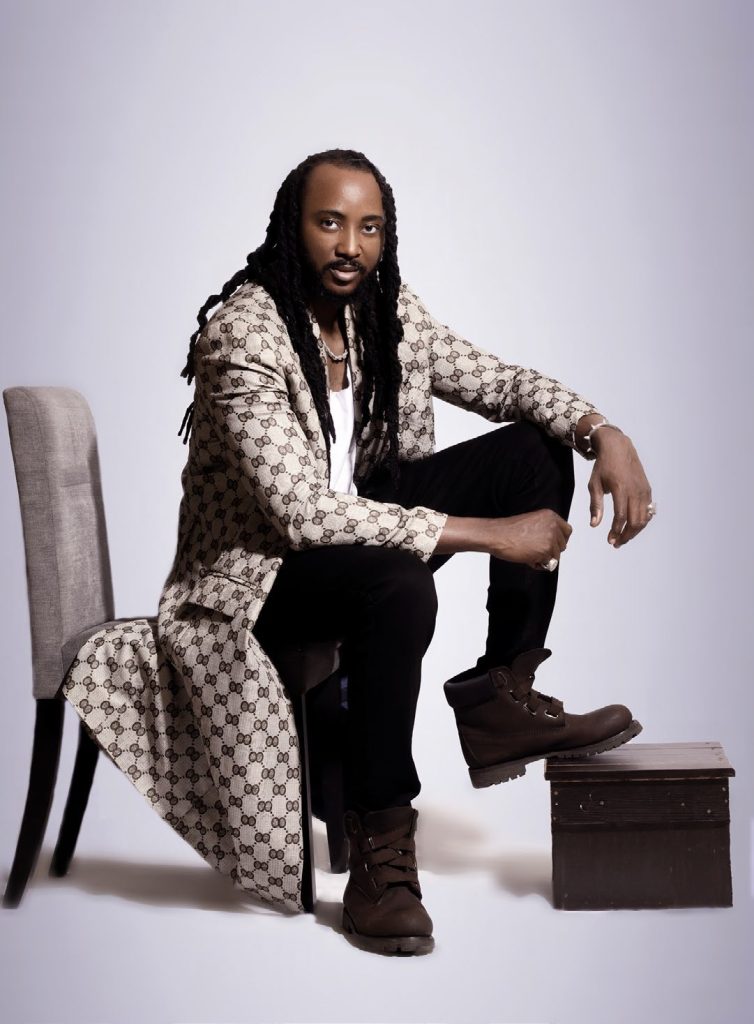
Titi Kuti
You wear tattoo sleeves a lot. Have you ever considered getting tatted up?
I thought of it severally, but I just couldn’t make up my mind on what to get tatted on me. That’s the only reason I don’t have one. If I get one today, within a year my whole body will be painted. It’s obviously also permanent. So that’s why I just settled for tattoo sleeves. Up until when I can decide that there’s a particular design I want permanently, I’ll be using the sleeves. I can buy and wear them anytime. Some of them look so real too.
Outside of the film industry, do you have any other major interests or passions?
I’ve always wanted to be a flyboy. Whether in the air force or as a commercial pilot. The military was actually my first love. It was my dream to either be in the military or be a pilot. Or both: a military pilot [laughs]. Even if I don’t go into commercial flights, I’ll definitely get a plane and learn to fly around the world.
How would you rate your satisfaction level at this stage of your career?
The truth is, every creative is insatiable. The minute you have an accomplishment, you start looking forward to the next level and I am very guilty of that. It’s just how I’m wired. I’m always trying to move forward. Sometimes in my moving forward, it has moved me back. That doesn’t stop me though. I’m very insatiable, not greedy, but insatiable. I’m happy with the progression so far, but in terms of being satisfied, very far from it.
Photography – Gift Eghator @graphedbyblue
Stylist – John Angel For De Angelic Touch @deangelictouch
Creative Direction by the Editor, Onah Nwachukwu @onahluciaa
Ripped T-Shirt, Black Jeans, Silver Twist Necklace, Silver Punk
Bracelet, Trench Coat, Brown Timberland Boots & Rings -Stylist’s
Wardrobe
Boluwatife Adesina is a media writer and the helmer of the Downtown Review page. He’s probably in a cinema near you.




